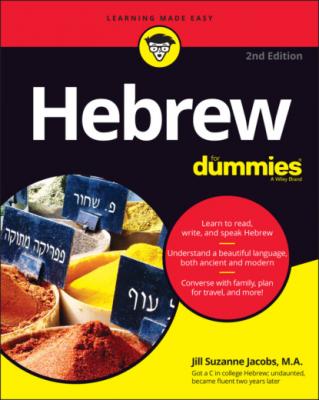Hebrew For Dummies. Jill Suzanne Jacobs
Читать онлайн.| Название | Hebrew For Dummies |
|---|---|
| Автор произведения | Jill Suzanne Jacobs |
| Жанр | Иностранные языки |
| Серия | |
| Издательство | Иностранные языки |
| Год выпуска | 0 |
| isbn | 9781119862048 |
Opening your mouth to say “Ah!”
Third, watch the pronunciation of your vowels. When pronouncing the ah sound, pronounce that vowel fully. Open your mouth wide and say “Ah” as though you were at the doctor’s office. Hebrew doesn’t have a short i sound (like the vowel sound in sit), so any time you see an i, remember to make it a long sound, like the ee in Whoopee! In Hebrew, oh sounds are long, as in over.
Counting in Hebrew
Learning how to count is fundamental to the study of any language. Hebrew divides words into masculine and feminine genders (see Chapter 2), and numbers are no different; they have masculine and feminine forms. You may feel a little confused, but don’t worry! Table 1-1 gives you the cardinal numbers (the numbers you use for counting) from 1 to 10. When you want to count without counting objects, use the feminine form. See “Counting objects” later in this chapter to find out how to incorporate gender into numbers.
TABLE 1-1 Counting from 1 to 10
| Number | Masculine | Feminine |
|---|---|---|
| 1 | אֶחָד (eh-ḥad) | אַחַת (ah-ḥat) |
| 2 | שְׁנַיִם (shnah-eem) | שְׁתַּיִם (shta-yim) |
| 3 | שְׁלוֹשָׁה (shloh-sha) | h שָׁלוֹשׁ (sha-lohsh) |
| 4 | אַרְבָּעָה (ahr-bah-ah) | אַרְבַּע (ahr-bah) |
| 5 | חֲמִשָּׁה (ḥah-mee-shah) | חָמֵשׁ (ḥah-mesh) |
| 6 | שִׁשָּׁה (shee-shah) | שֵׁישׁ (shesh) |
| 7 | שִׂבַּע (sheev-ah) | שֶׁבַע (she-vah) |
| 8 | שְׁמוֹנָה (shmoh-nah) | שְׁמוֹנֶה (shmoh-neh) |
| 9 | תִּשְׁעָה (teesh-ah) | תֵּשַׁע (tey-sha) |
| 10 | עֲשָׂרָה (ah-sah-rah) | r עֶשֶׂר (eh-sehr) |
Counting objects
The gender of the number you use when you want to count something depends on the gender of the noun you’re counting. (Sound confusing? Don’t worry. You can do it.) Counting objects in Hebrew is easy. Just remember to do the following things:
Figure out the gender of the noun you’re counting. If you want to talk about one book, first you must figure out whether the noun book is masculine or feminine. (It’s masculine.) So, when you count books, you need to use the masculine form of the number.
Place the number appropriately before or after the noun. For the number 1, you place the number after the noun. So rather than saying “one book,” you say, “book one” (סֵפֶר אֶחָד; seh-fehr eh-chad). But after you get to the number two, place the number before the noun. In Hebrew, the plural of סֵפֶר is סְפָרִים (sfah-reem; books). So, to say “two books,” you say שְׁנֵי סְפָרִים (shnay sfah-reem); for “three books,” say שְׁלוֹשָׁה סְפָרִים (shloh-shah sfah-reem); for “four books,” say אַרְבָּעָה סְפָרִים (ahr-bah-ah sfah-reem); and so on.
Counting higher
To form the numbers 11–19, place the second number in front of the 10. In the masculine form, for example, 11 is אַחַד עָשָׂר. In the feminine form, 11 is אַחַת עֶשְׂרֵה (ah-chaht es-reh). Table 1-2 shows the numbers 11–19.
The multiples of ten (10, 20, 30, and so on) are easy because these numbers are gender-neutral. Table 1-3 shows the multiples of 10.
TABLE 1-2 Counting from 11 to 19
| Number | Masculine | Feminine |
|---|---|---|
|
11
|
